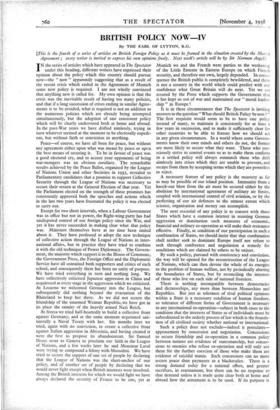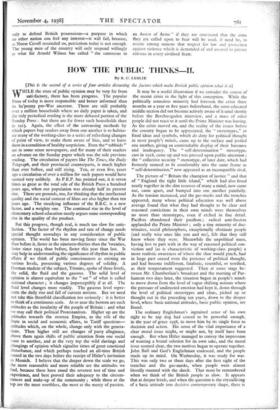BRITISH POLICY NOW IV
By THE EARL OF LYTTON, K.G.
[This is the fourth of a series of articles on British Foreign Policy as it must be framed in the situation created by the Munich Agreement ; every writer is invited to express his own opinions freely. Next week's article will be by Sir Norman Angell] Peace—of course, we have all been for peace, but without any agreement either upon what was meant by peace or upcn the best means of securing it. To be in favour of peace was a good electoral cry, and to accuse your opponents of being war-mongers was an obvious corollary. The remarkable results achieved by the Peace Ballot, organised by the League of Nations Union and other Societies in 1935, revealed to Parliamentary candidates that a promise to support Collective Security through the League of Nations was necessary to secure their return at the General Election of that year. Yet the Parliament elected on the strength of those promises has consistently approved both the speeches and actions which in the last two years have frustrated the policy it was elected to carry out.
Except for two short intervals, when a Labour Government was in office but not in power, the Right-wing party has had undisputed control of our foreign policy since the War, and yet it has never succeeded in making clear what that policy was. Ministers themselves have at no time been united about it. They have professed to adopt the new technique of collective action through the League of Nations in inter- national affairs, but in practice they have tried to combine it with the old technique of Power Diplomacy. The Govern- ment, the majority which support it in the House of Commons, the Government Press, the Foreign Office and the Diplomatic Service have all contained both supporters and critics of each school, and consequently there has been no unity of purpose. We have tried everything in turn and nothing long. We have collectively criticised Japanese aggression in China and acquiesced at every stage in the aggression which we criticised. At Locamo we welcomed Germany into the League, but subsequently did nothing beyond the evacuation of the Rhineland to keep her, there. As we did not secure the friendship of the unarmed Weimar Republic, we have got in its place the enmity of the heavily armed Nazi Reich.
At Stresa we tried half-heartedly to build a collective front against Germany, and at the same moment negotiated uni- laterally a Naval Treaty with her. Six months later we tried, again with no conviction, to create a collective front against Italian aggression in Abyssinia, and having created it were the first to propose its abandonment. Sir Samuel Hoare went to Geneva to proclaim our faith in the League of Nations, and a few weeks later he and Monsieur Laval were trying to compound a felony with Mussolini. We have tried to secure the support of one set of people by declaring that the League of Nations was the sheet-anchor of our policy, and of anothei set of people by declaring that we would never fight except when British interests were involved. Among the British interests for which we would fight we have always declared the security of France to be one, yet at Munich we and the French were parties to the weakening of the Little Entente in Eastern Europe on which French security, and therefore our own, largely depended. In conse- quence the British public is completely bewildered, and there is not a country in the world which could predict with any confidence what Great Britain will do next. Yet we are assured by the Press which supports the Government that it has kept us out of war and maintained our " moral leader- ship " in Europe !
It is in these circumstances that The Spectator is inviting answers to the question " What should British Policy be now ? " The first requisite would seem to be to have one policy instead of many, to maintain it consistently for at least a few years in succession, and to make it sufficiently clear for other countries to be able to foresee how we should act in any given circumstances. In a world where some Govern- ments know their own minds and others do not, the former are more likely to secure what they want. Those who con- sciously strive to control events so as to make them conform to a settled policy will always outmatch those who drift aimlessly into crises which they are unable to prevent, and escape from them by accepting terms which they are powerless to reject.
A necessary feature of any policy is the recovery as far as may be possible of our island position. Immunity from a knock-out blow from the air must be secured either by the abolition by international agreement of military air forces, coupled with international control of civil aviation, or by the perfecting of our air defences to the utmost extent which science, organisation and money can accomplish.
The next essential of any policy is to concert with those States which have a common interest in resisting German aggression or domination such measures of economic, financial and military co-operation as will make their resistance effective. Finally, as condition of our participation in such a combination of States, we should insist that that combination shall neither seek to dominate Europe itself nor refuse to seek through conference and negotiation a remedy for conditions which are claimed by others to be unjust.
By such a policy, pursued with consistency and conviction, the way will be opened for the reconstruction of the League of Nations, which can then devote the whole of its energies to the problem of human welfare, not by periodically altering the boundaries of States, but by reconciling the interests of those who live on each side of national frontiers.
There is nothing incompatible between democracies and dictatorships, any more than between Monarchies and Republics. But just as tolerance of rival political opinions within a State is a necessary condition of human freedom, so tolerance of different forms of Government is necessary to any international co-operation—subject in both cases to the condition that the interests of States as of individuals must be subordinated to the orderly process of law which is the founda- tion of all civilised society whether national or international.
Such a policy does not exclude—indeed it postulates— appeasement by concession and negotiation. Concessions to secure friendship and co-operation in a common policy between nations are evidence of statesmanship, but conces- sions to enemies who refuse co-operation and will only use them for the further coercion of those who make them are evidence of suicidal mania. Such concessions can no more secure peace than payments to a blackmailer. There is a strong demand today for a national effort, and greater sacrifices, in rearmament, but there can be no response to that demand unless it is made quite clear both at home and abroad how the armament is to be used. If its purpose is only to defend British possessions—a purpose in which no other nation can feel any interest—it will fail, because, as Nurse Cavell reminded us, patriotism today is not enough. The young men of the country will only respond willingly to what Sir Arnold Wilson has called " the summons to an Assize of Arms " if they are convinced that the arms they are called upon to bear will be used, if need be, to secure among nations that respect for law and protection against violence which is demanded of and assured to private citizens in every civilised State.











































 Previous page
Previous page